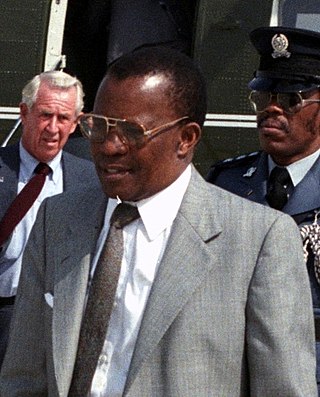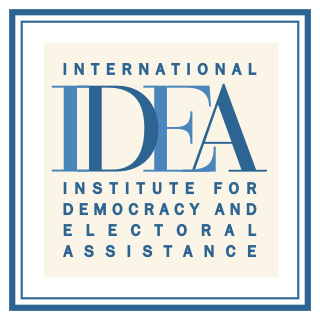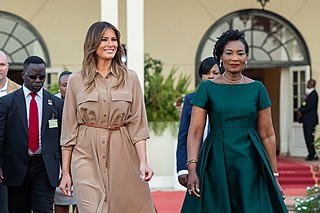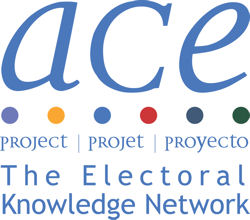Related Research Articles

Malawi, officially the Republic of Malawi and formerly known as Nyasaland, is a landlocked country in Southeastern Africa. It is bordered by Zambia to the west, Tanzania to the north and northeast, and Mozambique to the east, south and southwest. Malawi spans over 118,484 km2 (45,747 sq mi) and has an estimated population of 19,431,566. Malawi's capital is Lilongwe. Its second-largest is Blantyre, its third-largest is Mzuzu and its fourth-largest is its former capital, Zomba.

Ketumile Quett Joni Masire, GCMG, was the second and longest-serving president of Botswana, in office from 1980 to 1998. He was honored with the Knighthood of the Grand Cross of Saint Michael and Saint George by Queen Elizabeth II in 1990.

The International Republican Institute (IRI) is an American nonprofit organization founded in 1983 and funded and supported by the United States federal government. Most of its board is drawn from the Republican Party. It is committed to advancing freedom and democracy worldwide by helping political parties to become more issue-based and responsive, assisting citizens to participate in government planning, and working to increase the role of marginalized groups in the political process, including women and youth. It was initially known as the National Republican Institute for International Affairs.
The International Foundation for Electoral Systems (IFES) is an international, non-profit organisation founded in 1987. Based in Arlington, Virginia, United States, the organization assists and supports elections and electoral stakeholders. Since 1987, IFES has worked in 145 countries and has programs in more than 50 countries throughout Asia-Pacific, Africa, Eurasia, the Middle East, and North Africa, and the Americas.

The International Institute for Democracy and Electoral Assistance is an intergovernmental organization that works to support and strengthen democratic institutions and processes around the world, to develop sustainable, effective and legitimate democracies. It has regional offices in Europe, Latin America and the Caribbean, Asia and the Pacific and Africa and West Asia. The organization is headquartered in Stockholm, Sweden.

Kabissa – Space for Change in Africa is a volunteer-led non-governmental organization that promotes Information and Communication Technology (ICT) to empower and connect people and Civil Society Organizations (CSO) for positive change in Africa. Kabissa members are active throughout Africa, working on a range of crucial tasks including Advocacy and Policy, Arts, Culture, Conflict Resolution, Humanitarian Services, Economic Development, Poverty Reduction, Education, Environment, Gender, Governance, Health, Human Rights, Democracy, Media, Journalism, Microfinance, Technology, Training, Capacity Building and density of space.
Journalists for Human Rights (JHR) is Canada's largest international media development organization. Based in Toronto, Ontario, Canada, JHR was founded in 2002 by Benjamin Peterson and Alexandra Sicotte-Levesque in 2002. JHR's mission is to inspire and mobilize media to cover human rights stories in ways that help communities help themselves. The organization's vision is for everyone in the world to access their human rights.

The United States established diplomatic relations with Malawi in 1964 after Malawi gained independence from the United Kingdom. Malawi's transition from a one-party state to a multi-party democracy significantly strengthened the already cordial U.S. relationship with Malawi. Significant numbers of Malawians study in the United States. The United States has an active Peace Corps program, Centers for Disease Control and Prevention, Department of Health and Human Services, and an Agency for International Development (USAID) mission in Malawi. Both countries have a common history and English language, as they were part of the British Empire.
The Elections Reform Support Group (ERSG) was a forum of donors co-chaired by the United States and the European Union to coordinate the reform of the Palestinian electoral system. ESRG was founded in 2002. Members include the states of Denmark, Germany, Greece, Ireland, Italy, Japan, the Netherlands, Norway, Spain, Sweden, the United Kingdom, and the United States. Also international organizations such as the European Commission, the office of the European Union Presidency, the United Nations and the United Nations Development Program participate in this program. International Foundation for Electoral Systems supported the forum in secretarial role.
Electoral boundary delimitation is the drawing of boundaries of electoral precincts and related divisions involved in elections, such as states, counties or other municipalities. It can also be called "redistribution" and is used to prevent unbalance of population across districts. In the United States, it is called redistricting. Unbalanced or discriminatory delimitation is called "gerrymandering." Though there are no internationally agreed processes that guarantee fair delimitation, several organizations, such as the Commonwealth Secretariat, the European Union and the International Foundation for Electoral Systems (IFES) have proposed guidelines for effective delimitation.
The Consortium for Elections and Political Process Strengthening (CEPPS) is composed of nonprofit, nonpartisan, nongovernmental organizations dedicated to advancing and supporting democratic practices and institutions around the globe. Established in 1995, CEPPS pools the expertise of three premier international organizations dedicated to democratic development: the International Foundation for Electoral Systems, the International Republican Institute and the National Democratic Institute.
Media development involves capacity building for institutions or individuals related to freedom of expression, pluralism and diversity of media, as well as transparency of media ownership. Media development plays a role in democracy and effective democratic discourse through supporting free and independent media.

The ACE Electoral Knowledge Network is a web portal with information on elections designed to meet the needs of people working in the electoral field.

The history of human rights in Malawi during recent decades is complicated, and the situation at present is in a state of dramatic, and positive, transition.

American democracy promotion aims to encourage governmental and non-governmental actors to pursue political reforms that will lead ultimately to democratic governance.
The Institute of Economic Affairs (IEA), Ghana, is a public policy think tank based in Accra, Ghana. It is known to be Ghana’s premier public policy institute. It was founded by a Ghanaian economist, Dr. Charles Mensa in 1989 at a time when the country was governed by a military regime. The IEA was set up as an independent, non-government institution dedicated to the establishment and strengthening of a market economy and a democratic, free and open society. The IEA supports research, promotes and publishes studies on economic, socio-political and legal issues in order to enhance understanding of public policy.

Chesno is a Ukrainian public campaign that emerged late 2011 to advance a fair election process. It is widely known for its critical analysis and evaluation of politicians and the Verkhovna Rada (parliament) in Ukraine. The organization provides a public familiarization of political culture and every individual legislator as well as candidates to the People's Deputies of Ukraine in the country.

The Kofi Annan Foundation is an independent, not-for profit organization that works to promote better global governance and strengthen the capacities of people and countries to achieve a fairer, more peaceful world. It was founded and legally incorporated in Switzerland in 2007 by Kofi Annan, former secretary general of the United Nations.
The Institute for Democratic Alternatives in South Africa (IDASA) later known as the Institute for Democracy in South Africa was a South African-based think-tank organisation that was formed in 1986 by Frederik van Zyl Slabbert and Alex Boraine. Its initial focus from 1987 was creating an environment for white South Africans to talk to the banned liberation movement in-exile, the African National Congress (ANC) prior to its unbanning in 1990 by the President F. W. de Klerk. After the South African election in 1994, its focus was on ensuing the establishment of democratic institutions in the country, political transparency and good governance. Caught up in a funding crisis after the 2008 global financial crisis, closed in 2013.

The European Centre for Electoral Support (ECES) is a not-for-profit, private, non-partisan and independent foundation with its headquarters in the capital of Belgium, Brussels.
References
- 1 2 About EISA Archived 2009-08-07 at the Wayback Machine , EISA. Accessed July 28, 2009.
- ↑ Donors Archived 2002-06-12 at the Wayback Machine , EISA. Accessed July 29, 2009
- ↑ Ott, Martin. The power of the vote: Malawi's 2004 parliamentary and presidential elections. Kachere Series, 2005. p. 296. ISBN 978-99908-76-58-1. Found at Google Books
- 1 2 African Union Archived 2009-08-10 at the Wayback Machine IFES, 2009. Accessed July 9, 2009.
- ↑ MATABOGE, MMANALEDI Asmal takes on Parliament, Mail and Guardian, July 20, 2009. Accessed July 29, 2009.